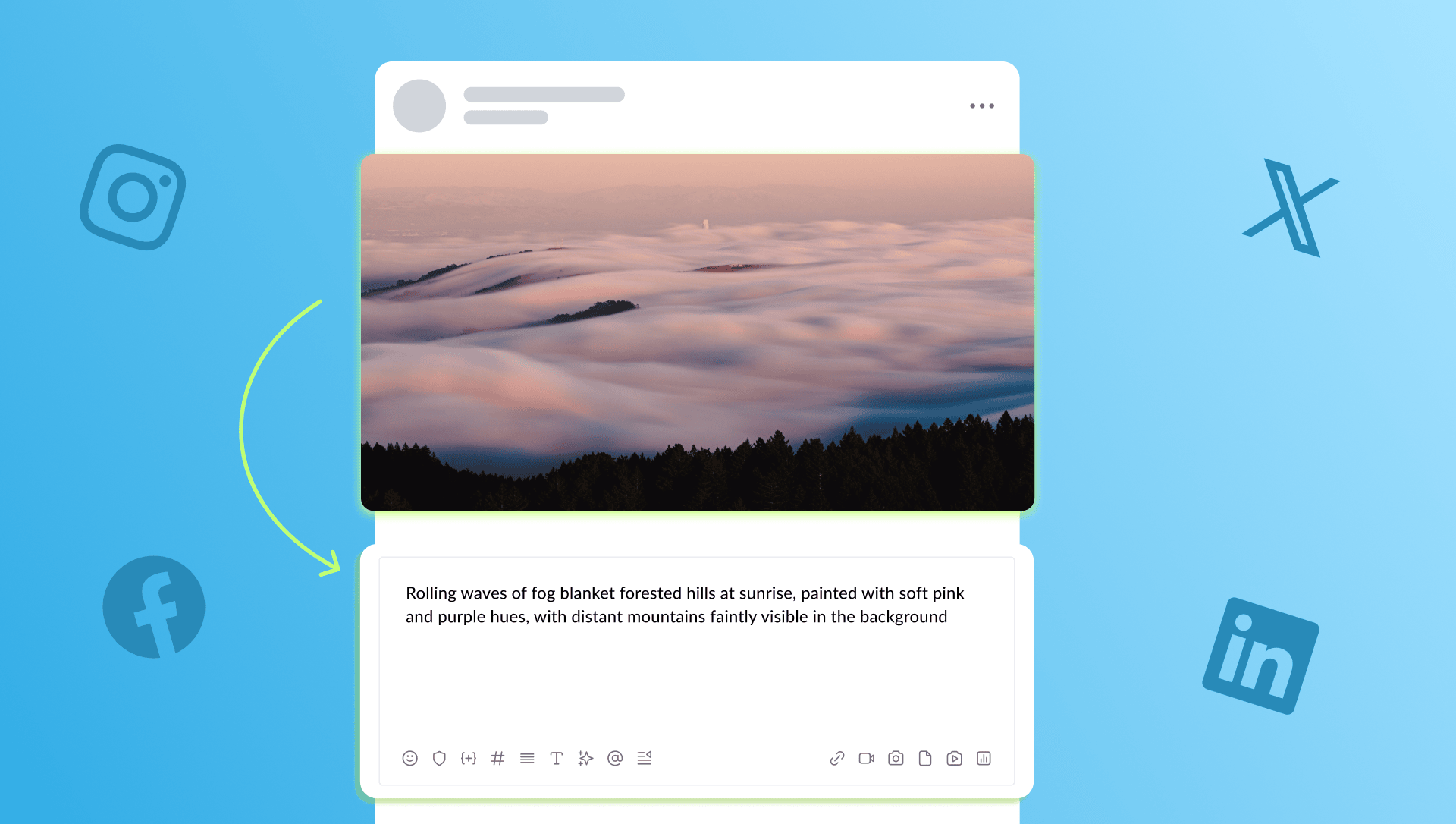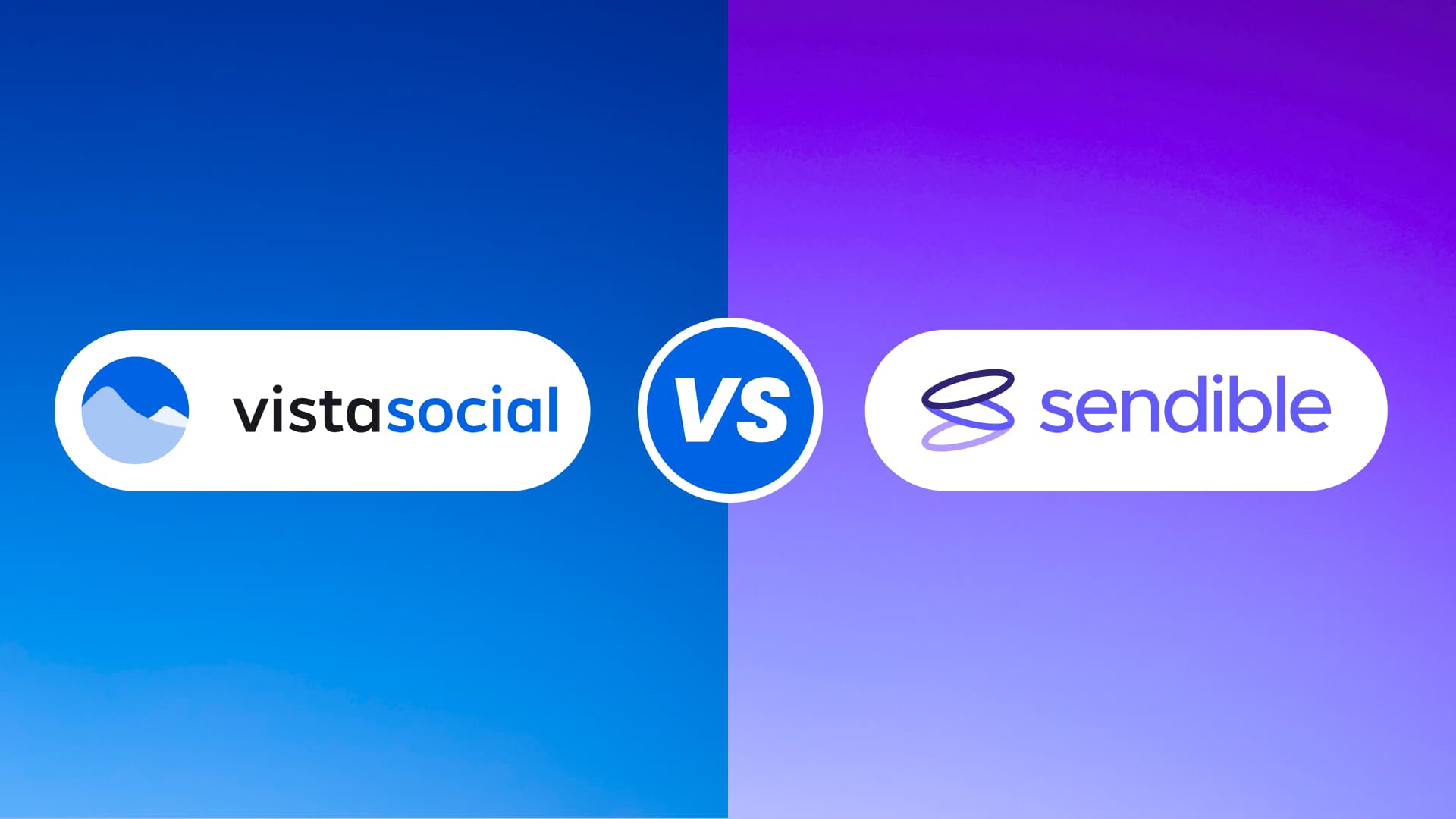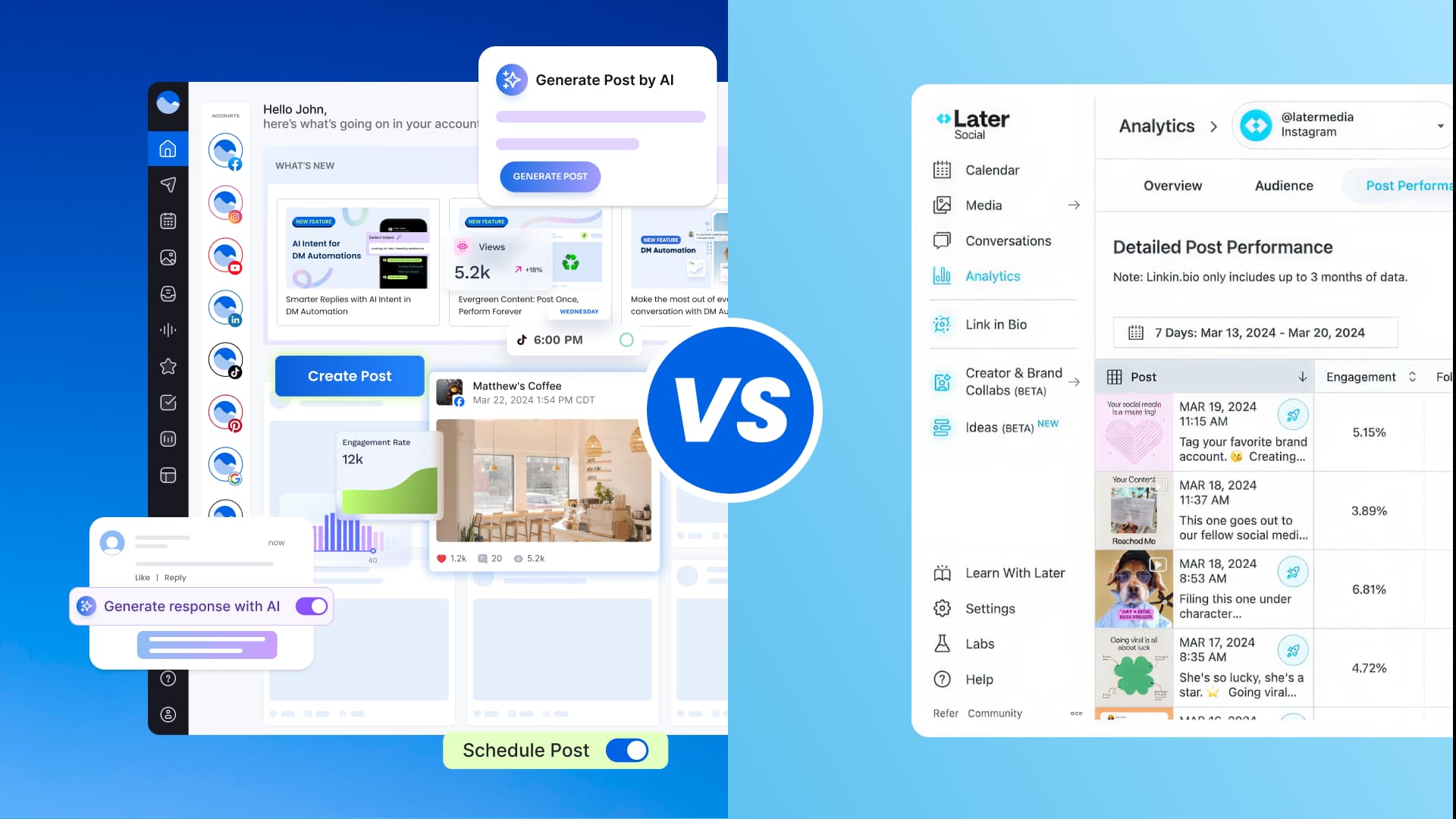New
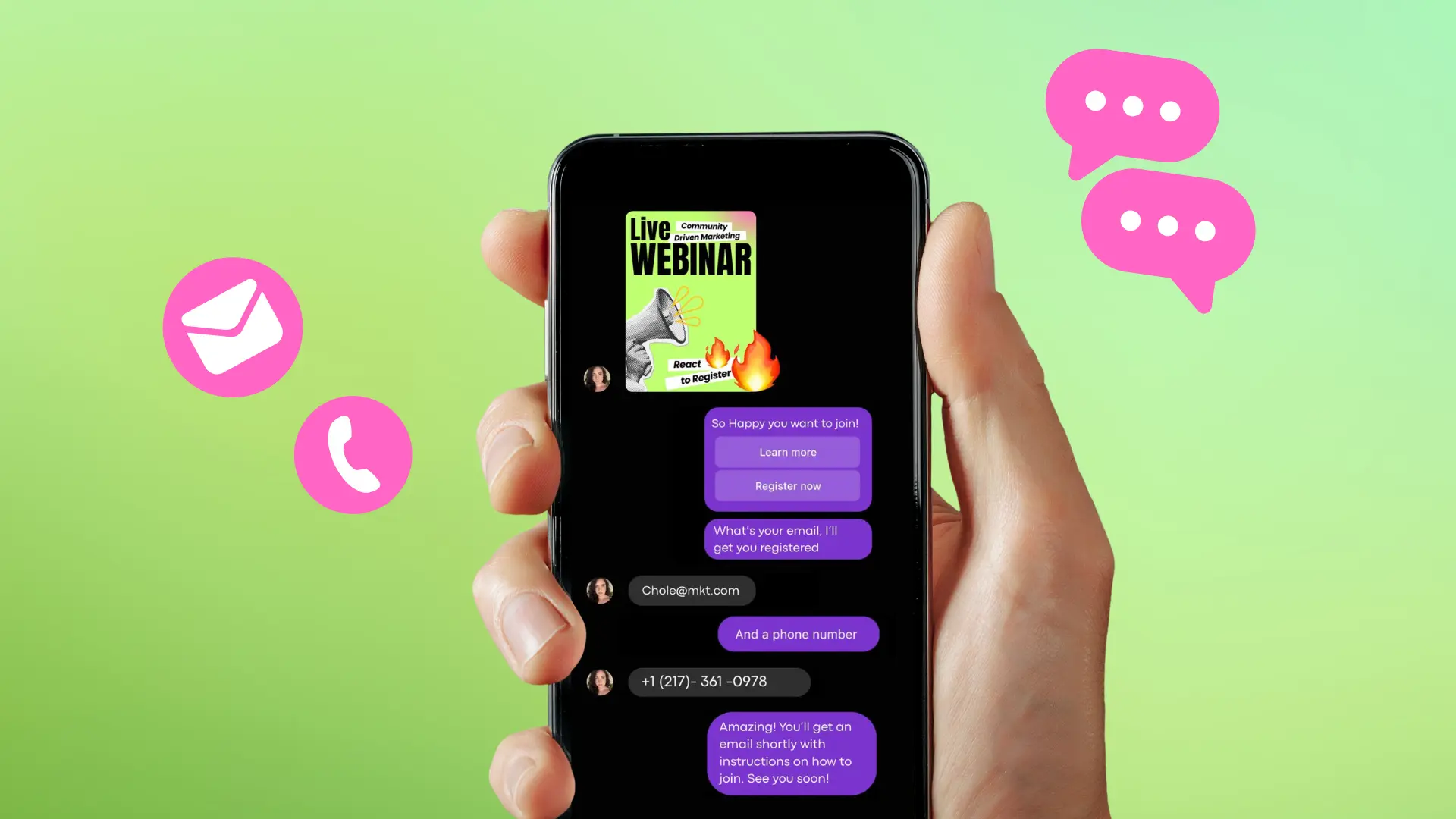
Turn Your DMs Into Lead Gen!
Learn how to collect lead data from your DMs such as email addresses, phone numbers, and more right from your social inbox. If you are not yet automating your DMs your competitors are outpacing you.

How Something Social Saved 75% of Their Time and Increased Revenue by 15%
See how a fast-growing agency improved operations, cut down hours of manual work, and unlocked new revenue opportunities with Vista Social.
New

50 Unique Social Media Ideas for Consistent Content Creation
Discover 50 unique social media post ideas to engage your audience, grow your brand, and maintain a consistent content strategy with ease!
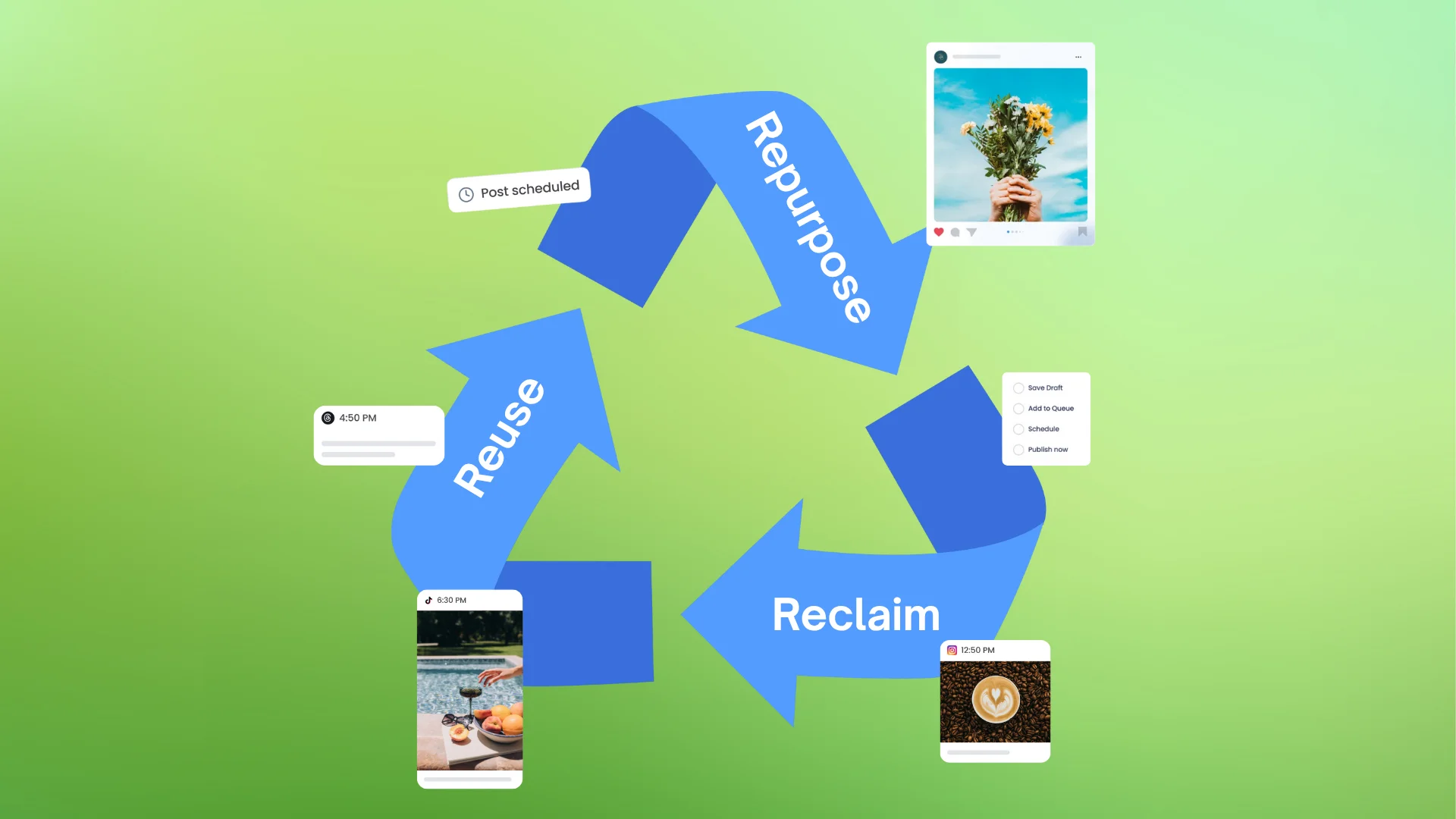
Mastering Content Reuse: The Key to a Consistent and Sustainable Posting Strategy
Published on June 10, 2024
10 min to read
How to Create Automated Social Media Reports
Summarize with AI
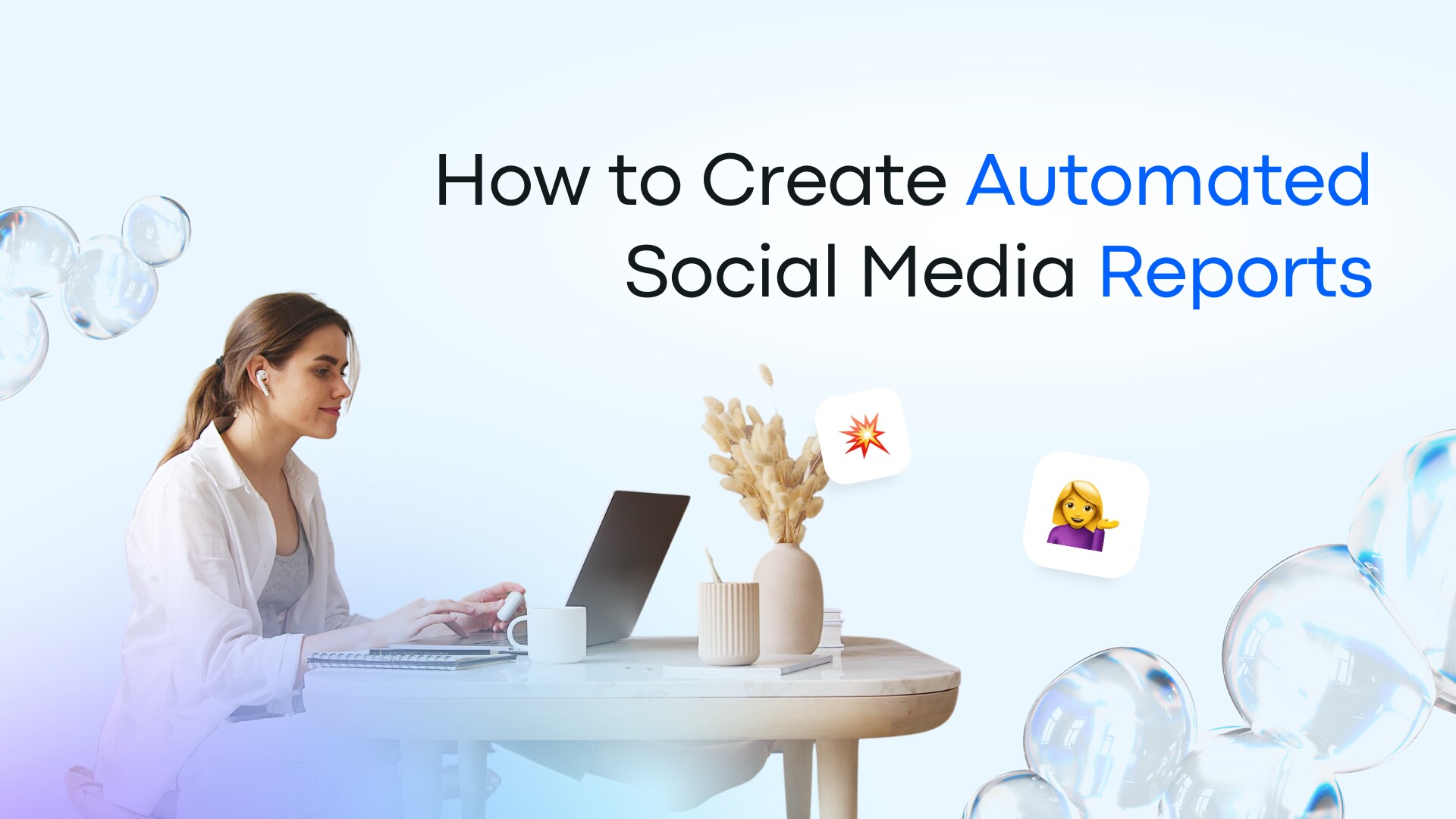
Summarize with AI
ChatGPT
Claude
Perplexity
Share
Vista Social
X (Twitter)
Table of contents
Summarize with AI
ChatGPT
Claude
Perplexity
Share
Vista Social
X (Twitter)
Generating social media reports isn’t sexy. 🤦
It takes a lot of time. It’s tedious. And if you aren’t paying very close attention to the buttons you’re clicking, you’ll likely make mistakes.
That’s why generating the reports manually isn’t ideal—it comes with too many drawbacks and inaccuracies.
However, automating your reports is the answer to efficiently scaling on social, and also giving stakeholders a peek into what’s working and what isn’t. You eliminate many manual, time-consuming tasks and streamline your reporting process. This opens the door to optimizations that ultimately lead to growth!
Automating reports is such a game changer that data shows that 50% of marketers use automation for social media management tasks, including reporting.
Table of contents
What you will learn
- What are automated social media reports?
- Why create automated social media reports?
- Key metrics for automated social media reports
- Steps to create automated social media reports
- Create automated social media reports with ease
What are automated social media reports?
Automated social media reports are automatically generated and shared using tools or software.
Reporting tools can gather all the essential data from social media platforms and compile it in a neat, easy-to-read performance report format with minimal human intervention.
The reports can include data on follower growth, engagement, and reach. It can also have more specific insights, such as the best time to post for optimal engagement.
Why create automated social media reports?
Between managing multiple profiles and juggling tasks such as content creation, keeping up with social media trends, and engaging followers, there’s hardly any time or energy left for detailed reporting.
[Must read: How to Manage Multiple Social Media Accounts [2024]]
This is where automated social media reports come in handy.
Automated reports can be total game-changers for social media managers for the following reasons.
Save time and energy
Automating your clients’ social media reports means getting back precious hours from your week.
Automated reports can do the heavy lifting by gathering and analyzing all the data.
You won’t need to pull metrics from multiple clients’ social media channels manually.
The best part is you get all the necessary insights in one neat package. All you need to do is review and share them with your clients.
Ensure consistent information and insights
Manual reports can easily miss the mark due to human error or outdated data.
However, automated reports rarely make these errors, giving you consistent and accurate analysis every single time.
You can say goodbye to miscalculations or missed data points with automated social media reports.
Get comprehensive overviews
Automated reports pull data from your clients’ connected social media platforms, giving you a big picture of their social media landscapes.
You can get an overall view of your clients’ Facebook reach, YouTube views, and Instagram engagement without constantly switching apps, saving you a lot of time and effort.
[Must read: Are Your YouTube Shorts Not Getting Views? Here’s Why…]
Access real-time insights
Former GE Vice Chair and CMO Beth Cornstock captured social media marketing in a nutshell when she said…
“Marketing’s job is never done. It’s about perpetual motion. We must continue to innovate every day.”
The quote highlights how the social media world moves quickly and constantly, so your reporting should follow suit if you want to keep up.
Report automation allows you access to real-time data, helping you monitor what’s working and what needs improvement.
This way, you can quickly access strategic insights, such as insights into Snapchats analytics data.
It allows you to pivot and adjust your clients’ social media marketing strategies on the fly and improve results.
[Must read: Snapchat Analytics Ultimate Guide: What to Track, FAQs, Etc.]
Customize reports easily based on your needs
Many automated reporting tools are easy to customize.
The right tool can simplify tailoring automated social media reports to focus on goals and metrics that matter most to your clients.
You and your clients will have control over what to track, analyze, and view, whether engagement, audience growth, or conversions.
Automated reporting tools make communicating and sharing detailed performance reports on social media content with clients easy.
Focus more on strategy
Automated reports save you from hours of compiling social media reports, allowing you to focus more on strategic planning.
With more time freed, you can explore more deeply what your clients’ social media data is telling you.
You can brainstorm new content ideas and strategies and refine your clients’ campaigns based on data-driven insights.
Impress your clients
Who doesn’t love a neat, good-looking report?
Many automated reporting tools include beautiful and easily customizable templates that can elevate your clients’ data visually.
With these tools, you can make your clients’ data look more impressive.
You can provide professional and easy-to-understand reports that better communicate your efforts’ success to your clients.
So, why lose sleep over manual reports when adopting automation can make your life easier?
Embrace the power of automated social media reports and work more efficiently and effectively. Trust us, your future self will thank you.
Key metrics for automated social media reports
Social media metrics included in reports depend on the goals and what needs to be measured.
Check out the essential social media metrics to include in your automated reports and why they’re crucial below.
Follower growth
Follower growth can tell you whether your clients’ are growing or losing followers.
Tracking the metric helps you determine common patterns in your clients’ followers.
For example, your clients can have more followers on Instagram than on Facebook.
[Must read: Instagram Following List Order Algorithm Explained [2024]]
The information allows you to assess where to focus your efforts to help your clients attract more followers or whether to cut the rope on low-following and engagement profiles.
Impressions and reach
Reach shows the unique social media users who see your clients’ content.
On the other hand, impressions are the total number of times your clients’ posts show on users’ feeds or the total number of times they see your clients’ content.
Impressions and reach indicate how well your clients’ content engages audiences.
For instance, low Facebook impressions and reach can mean that only a few people see your clients’ posts.
The data can tell you if you need to switch gears or refine your strategy, such as targeting the right audience.
Share of voice
The number of people talking about your clients’ brands on social media and how they feel about them compared to competitors is known as Share of voice.
It can include two metrics:
- Volume shows the number of times users mention your clients’ brands on the social media platform (tagged or untagged mentions)
- Sentiment indicates how users feel about your clients’ businesses, which is conveyed through specific messages or keywords associated with their brands
These can tell you where your clients’ brands stand against their competitors through social media discussions.
You can leverage social media listening tools to track and measure brand mentions.
Engagement rate
The engagement rate metric helps you understand how users engage with your clients’ social media content.
More likes, shares, and comments can indicate higher engagement rates.
The metric can also tell you the best times and days when your clients’ posts perform at their peak.
Engagement can be determined through the following:
- Click-Through Rate (CTR), which is the number of people who click on your client’s link after seeing their post
- Account mentions, which is the number of times users mentioned your clients’ brands on the social media platform
- Likes, shares, reposts, views, duets and stitches (TikTok), and other engagement actions
[Must read: How to Stitch on TikTok: Examples, Tips, Steps [2024]]
Low engagement rates usually suggest that few people engage with your clients’ posts.
Proper analysis via social media engagement tools can tell you the reason behind low engagement rates.
It can help refine your clients’ content and strategies to improve engagement rates.
Top posts
The top posts metric can tell you which type of content grabs the most attention on your clients’ social media pages.
It can help you determine what makes the posts popular or go viral, allowing you to recreate the content to boost audience engagement.
[Must read: How to Go Viral on TikTok: Actionable & Easy-to-Follow Tips]
Identifying your clients’ top-performing posts requires looking at the following:
- Likes, which represent the posts your clients’ audiences enjoy at a glance
- Share and hashtags, which signal the content types that are worth putting in front of audiences. Posts with at least one hashtag get 12.6% more engagement than those without, making it crucial to determine which hashtag posts get the most shares
- Comments and replies, which show the content types your clients’ audiences are most excited about
- Link clicks, which help you determine the posts that drive audience or follower action
- Impressions and reach, which help you determine the messages that are worth spreading across your clients’ target audiences
- New followers, which indicate the content responsible for growing your clients’ fan base
Social media publishing tools or features can automate the publishing of improved content to boost engagement and grow your clients’ following.
Steps to create automated social media reports
One of the best ways to create automated reports is to use social media analytics and reporting tools.
Social media management platform Vista Social offers robust analytics features that allow you to create and generate reports automatically.
[Must read: Best Platform For Social Media Management [2024]]
After connecting your clients’ social media profiles, the platform automatically captures and analyzes the data within two to three hours from the initial connection.
Then, it summarizes everything into easy-to-understand data insights and visualizations.
The metrics in your clients’ automated social media reports depend on what you want to track and measure.
Below are several metrics you can view and track in Vista Social’s reports.
- Audience growth shows the number of (net) followers gained within a specific period
- Engagement is the number of follower/fan interactions (shares, reactions, clicks, comments, and Direct Messages or DMs) with your clients’ social media pages
- Impressions refer to the number of times your client’s content was displayed, regardless of whether it was clicked
- Reach is the total number of unique users who have seen your client’s specific content on a social media platform
- Brand awareness score is the number of page shares and mentions of your content
- Views show the number of times your client’s videos were viewed
- Number of interactions by hashtags shows the number of interactions generated by the hashtags used in your clients’ social media posts
- Number of published posts is the total number of posts published on each social media platform
- Engagement by network shows the total engagement from each social media profile
- Top performing posts show the list of social media posts with the highest engagement and impressions
Here’s how you can use Vista Social to create and run automated social media reports.
Step 1: Go to Reports
On your Vista Social dashboard, go to Reports, then Run Report.
Click Schedule report.
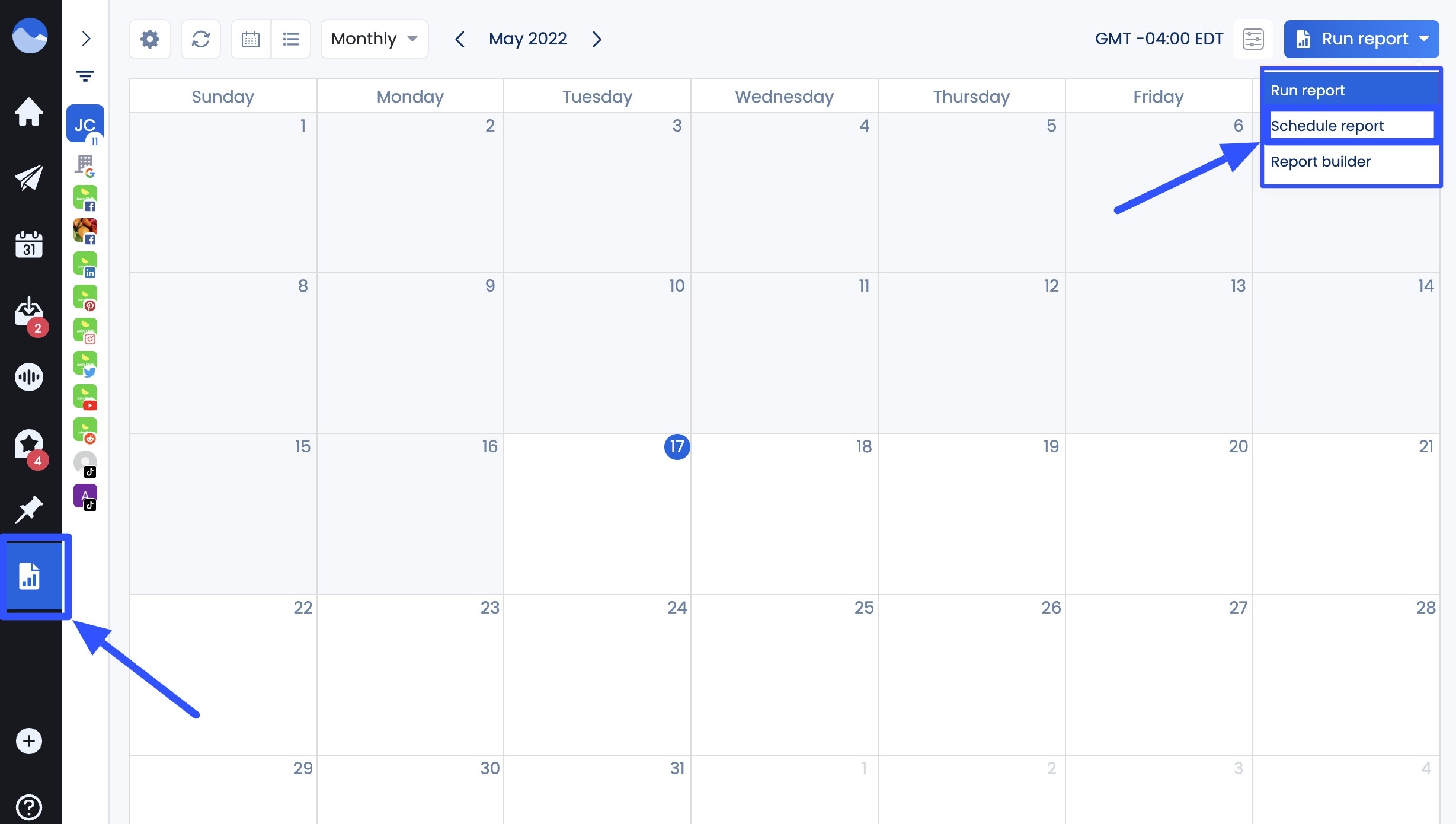
Select the type of report you want to run automatically, such as:
- Social media performance report
- Post performance report
- Tasks performance
- Review performance
- Competitor analysis
Step 2: Select the report you want to generate
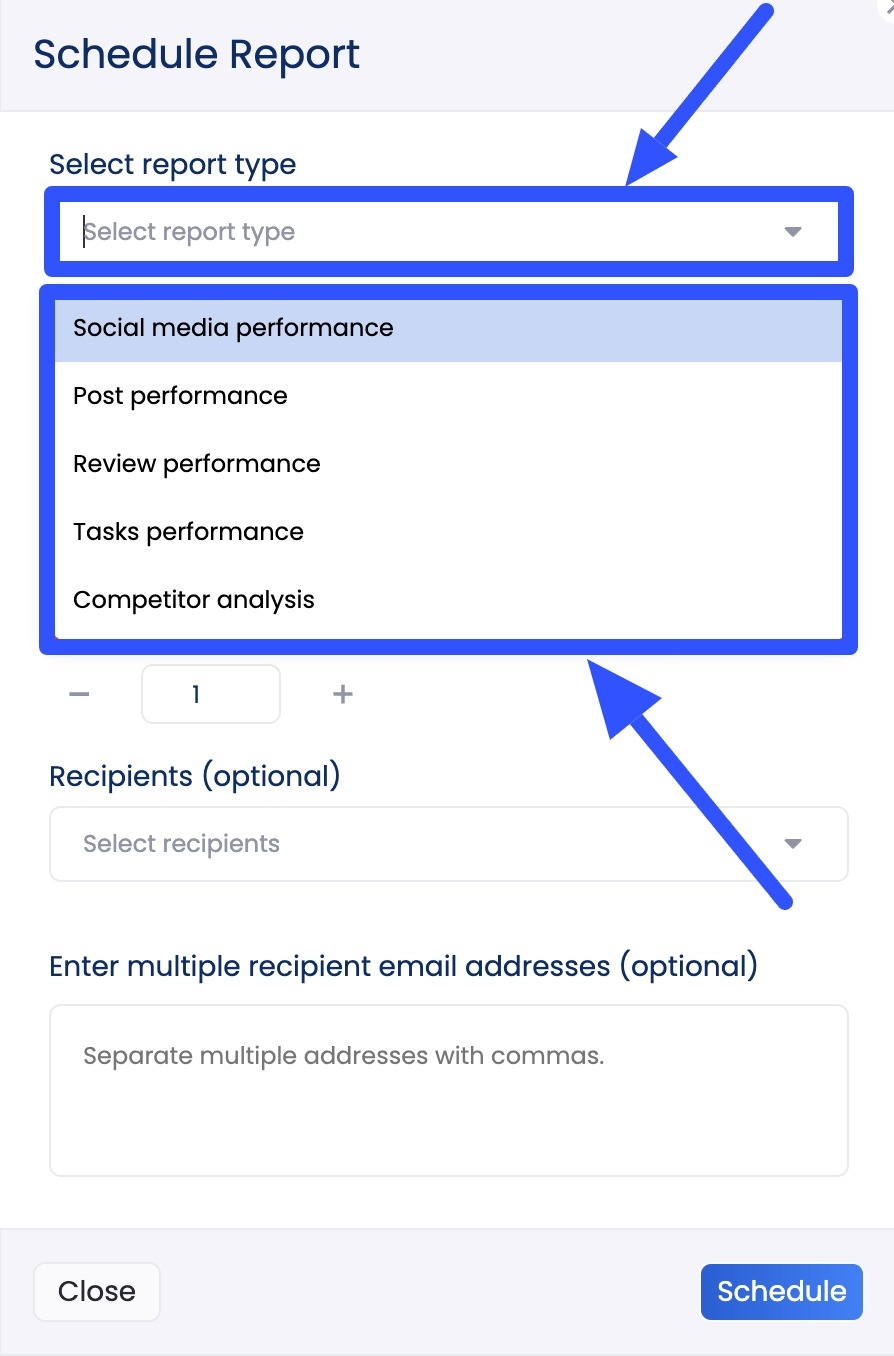
Select the timeframe or the period you want the report to cover. It can be monthly or weekly.
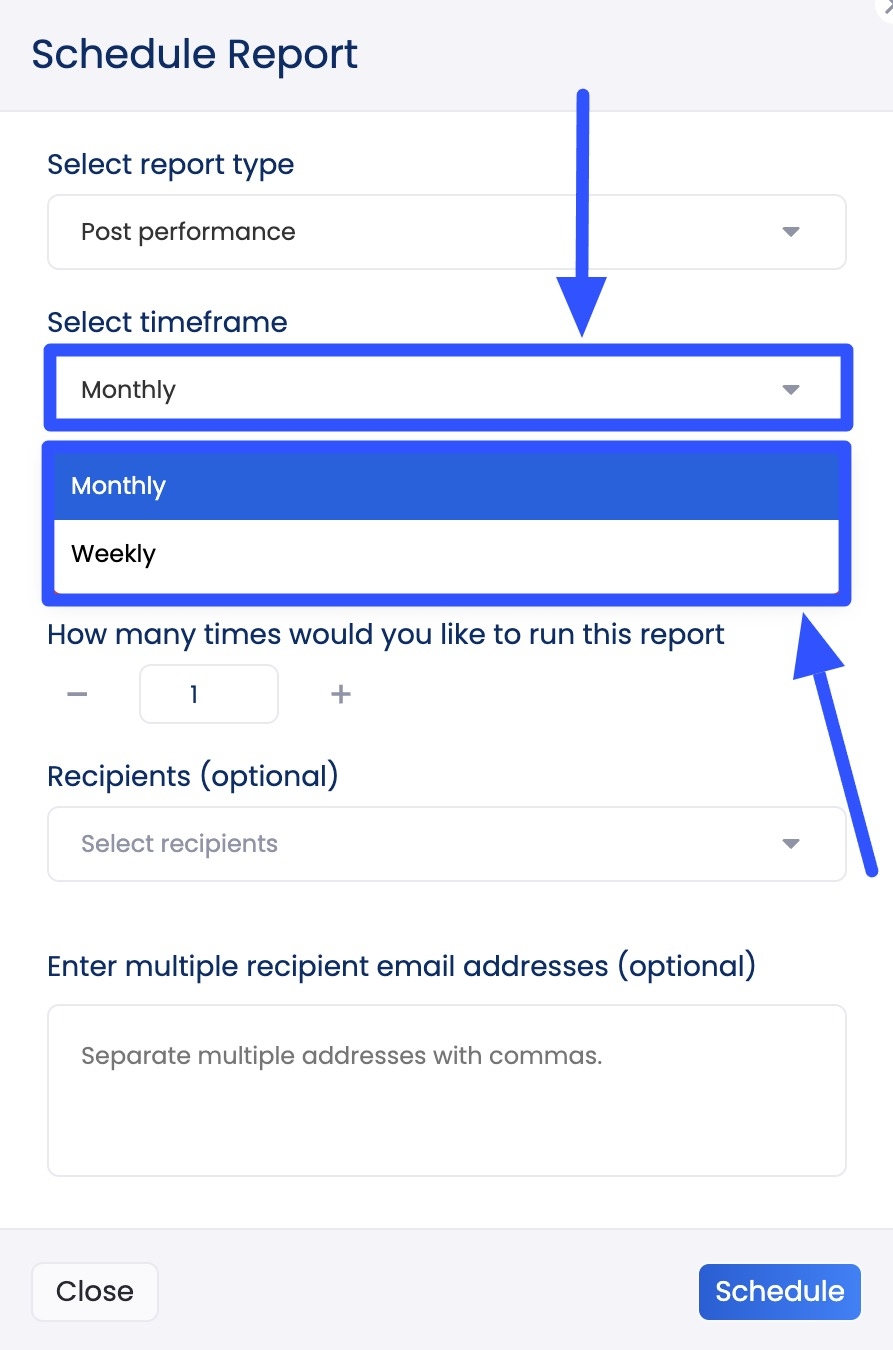
After selecting your preferred time frame, you can generate the date to begin the recurring report.
You can also set the number of times you want to run the report.
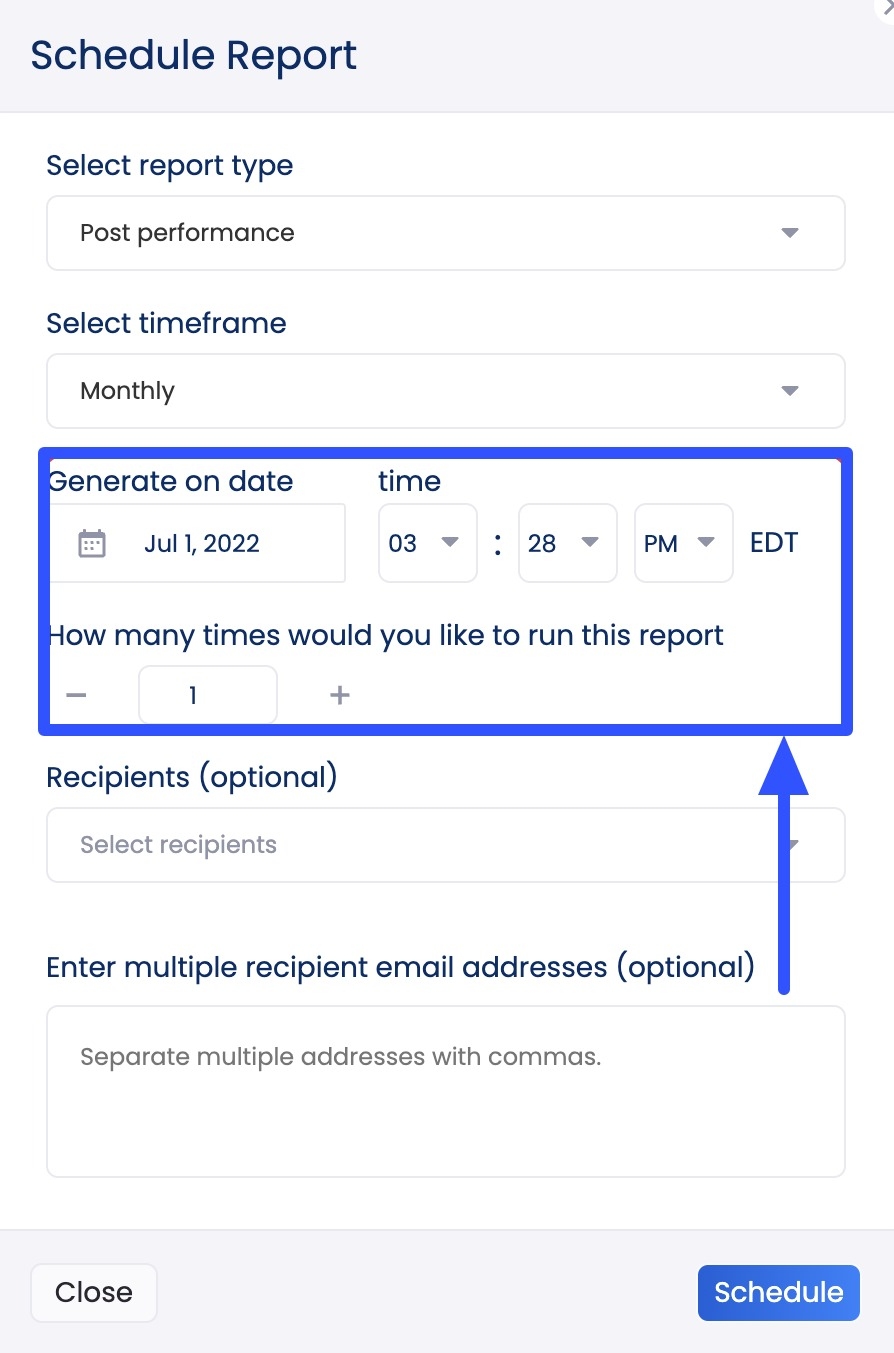
Step 3: Add your report recipients
Select recipients, and you’ll see the list of users you previously added to your Vista Social account.
If you haven’t added years to your account yet, check out this guide on adding users and setting up permissions.
You can add as many recipients as you want.
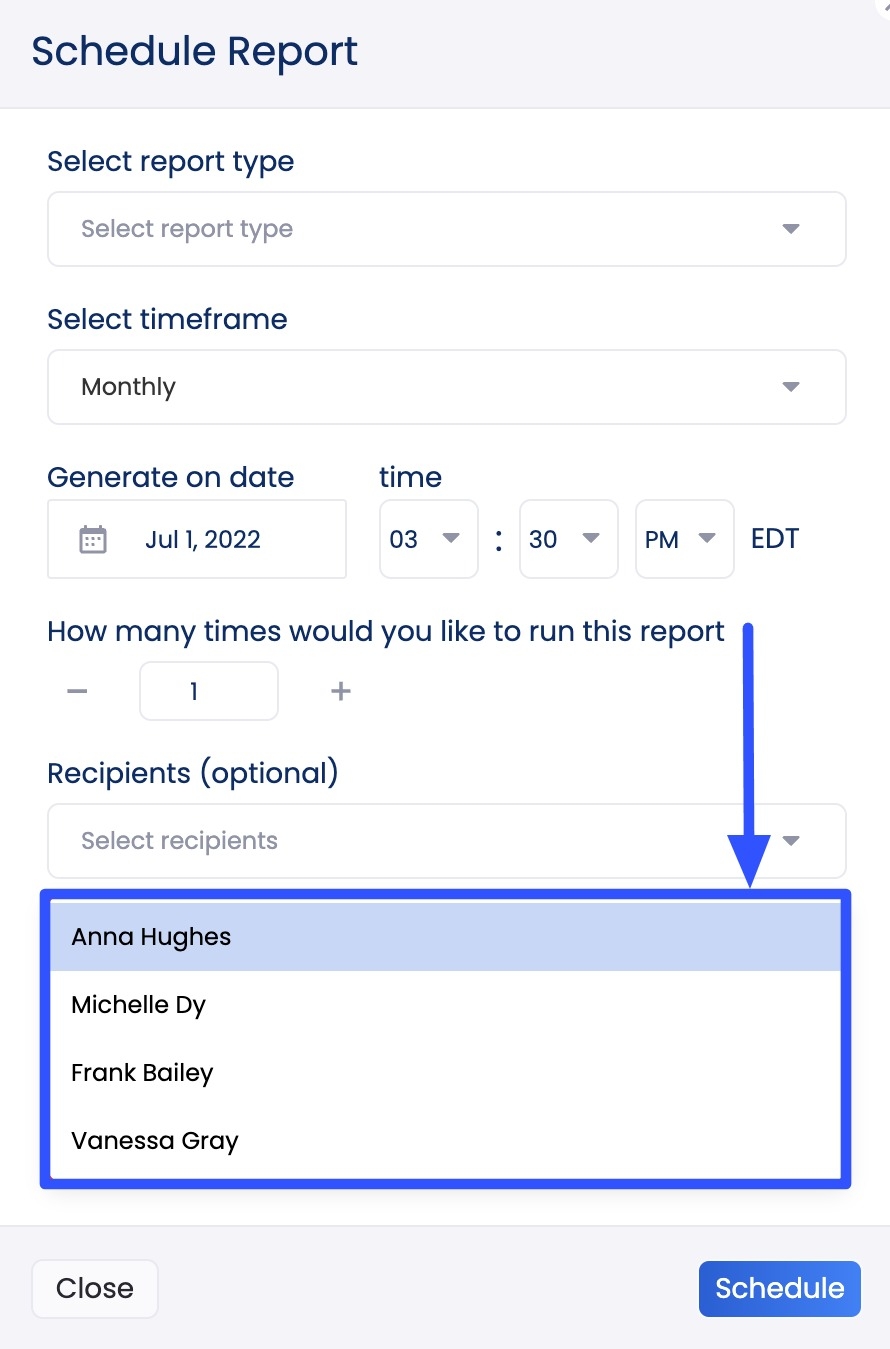
You can also add non-users as recipients by entering their email addresses in the designated field below.
Non-user recipients will receive a link in their email to download the reports.
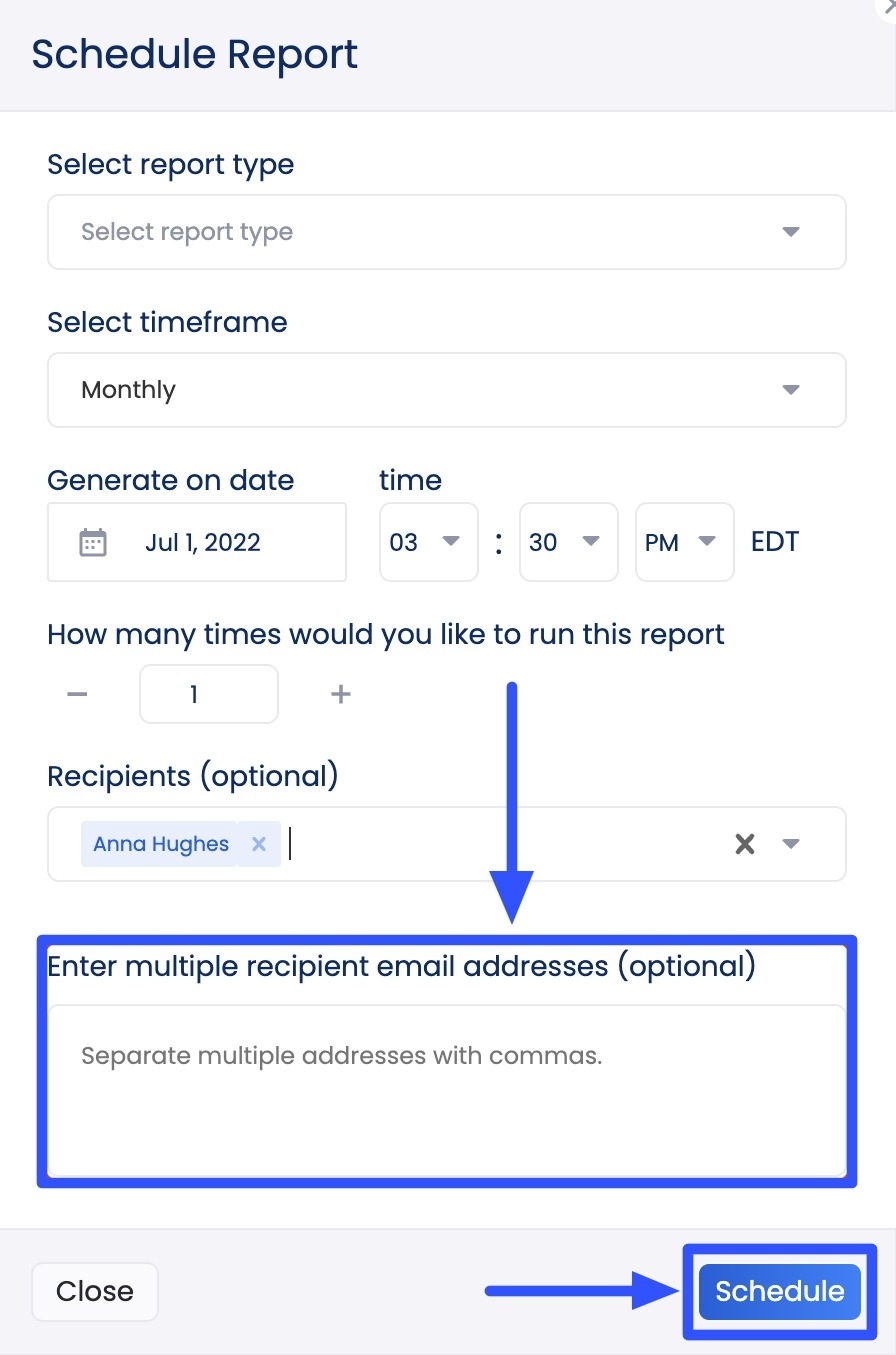
Click Schedule when you’re done.
Step 4: View and manage your reports on the calendar
All your previous and scheduled reports are shown in your reports calendar like this:
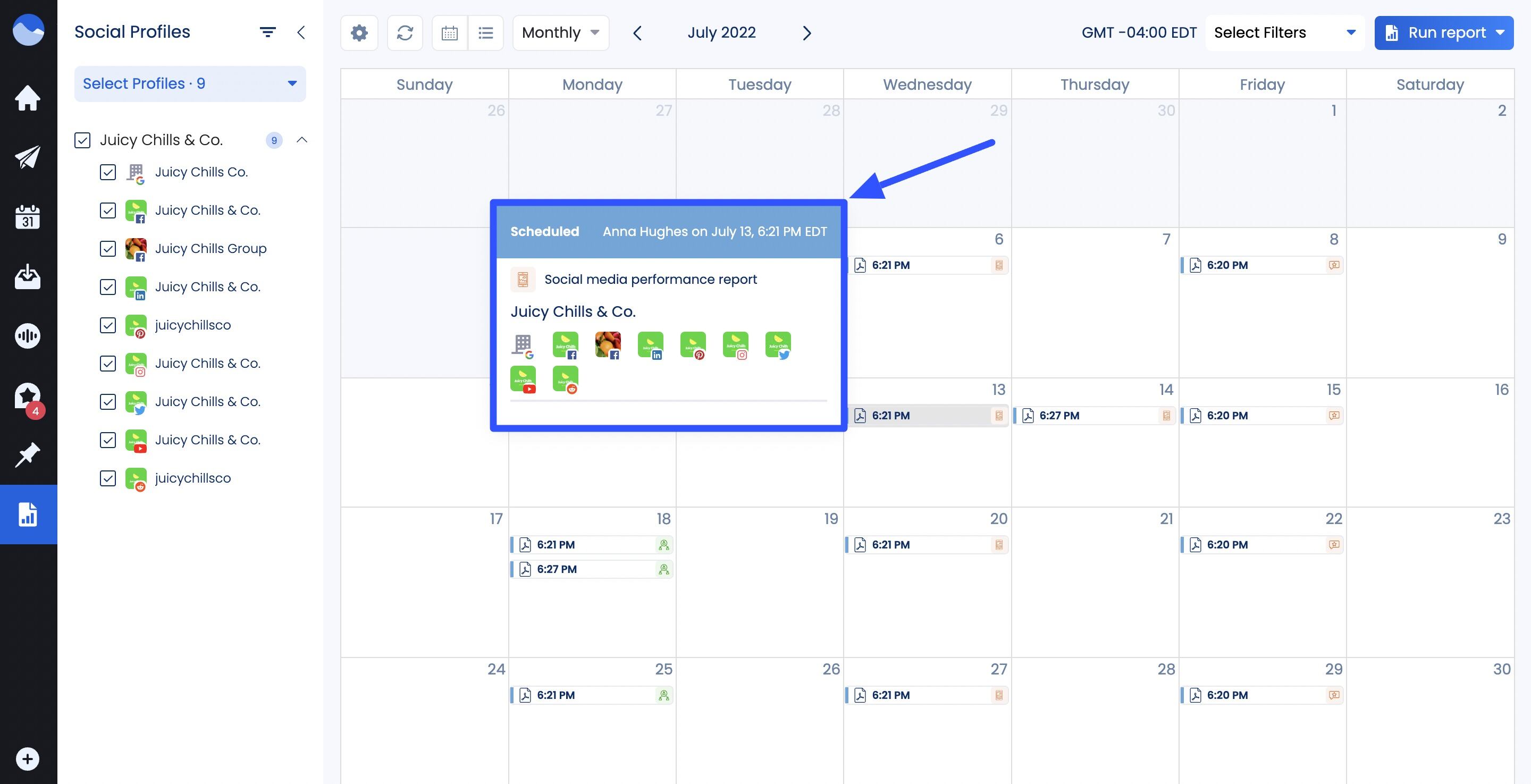
Generated reports include a Download button, allowing you to get a copy anytime.
Vista Social automatically syncs and refreshes your social media report data every five to six hours, so you get the latest information at those intervals.
That’s it.
You’ve just set up your clients’ social media reports to run, generate, and send to your recipients on Vista Social automatically.
How to create custom automated social media report templates
What if you want to change or specify the automated reports you want to run and generate?
Vista Social’s got your back with its custom report templates.
The platform lets you customize what you want to track, measure, and view in your clients’ social media reports.
You can easily add or remove metrics and save the template for future use.
Start by navigating to Reports > Run Report > Report Builder on your Vista Social dashboard.
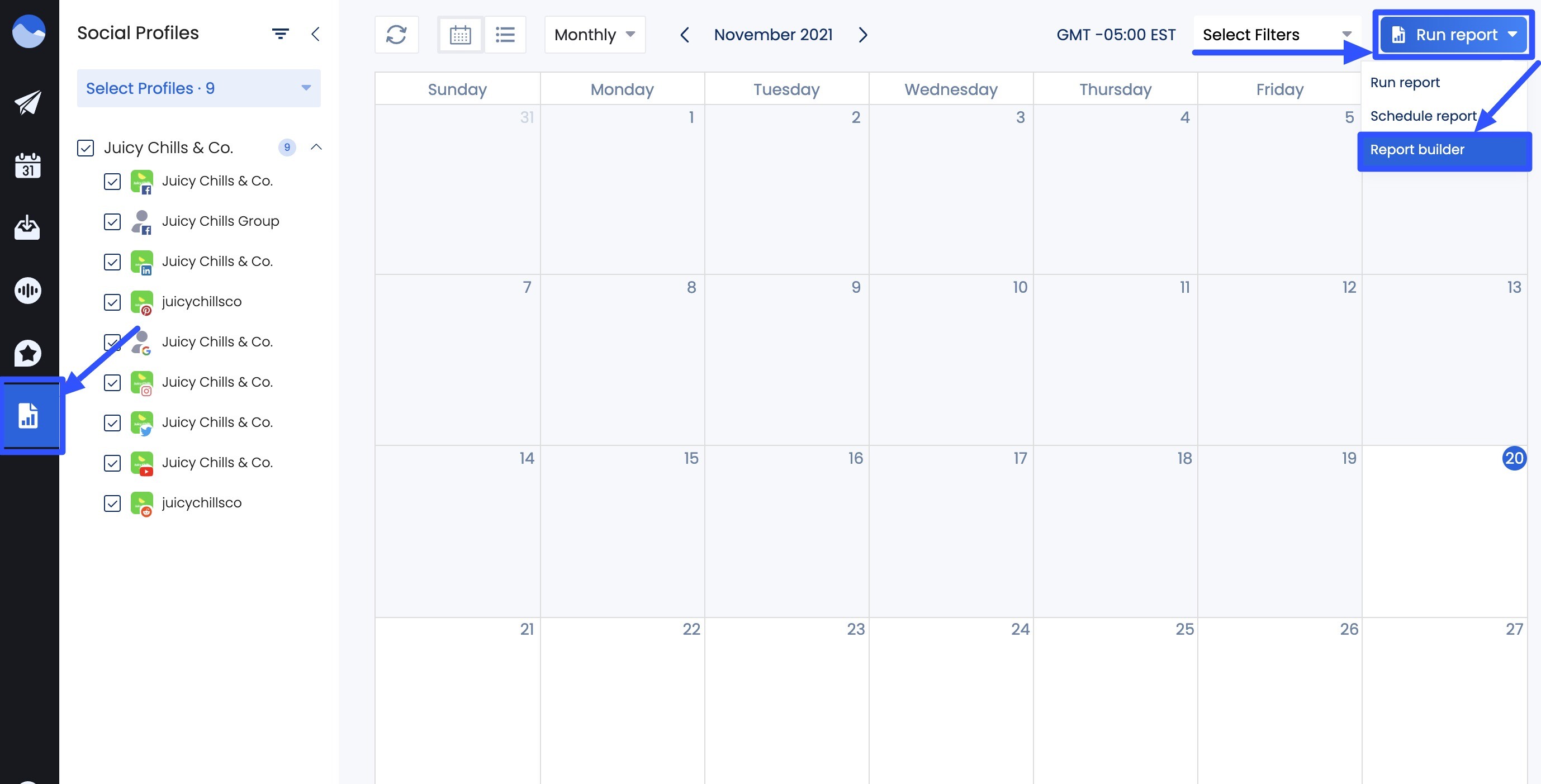
Select Add Template on the Report Builder pop up window.
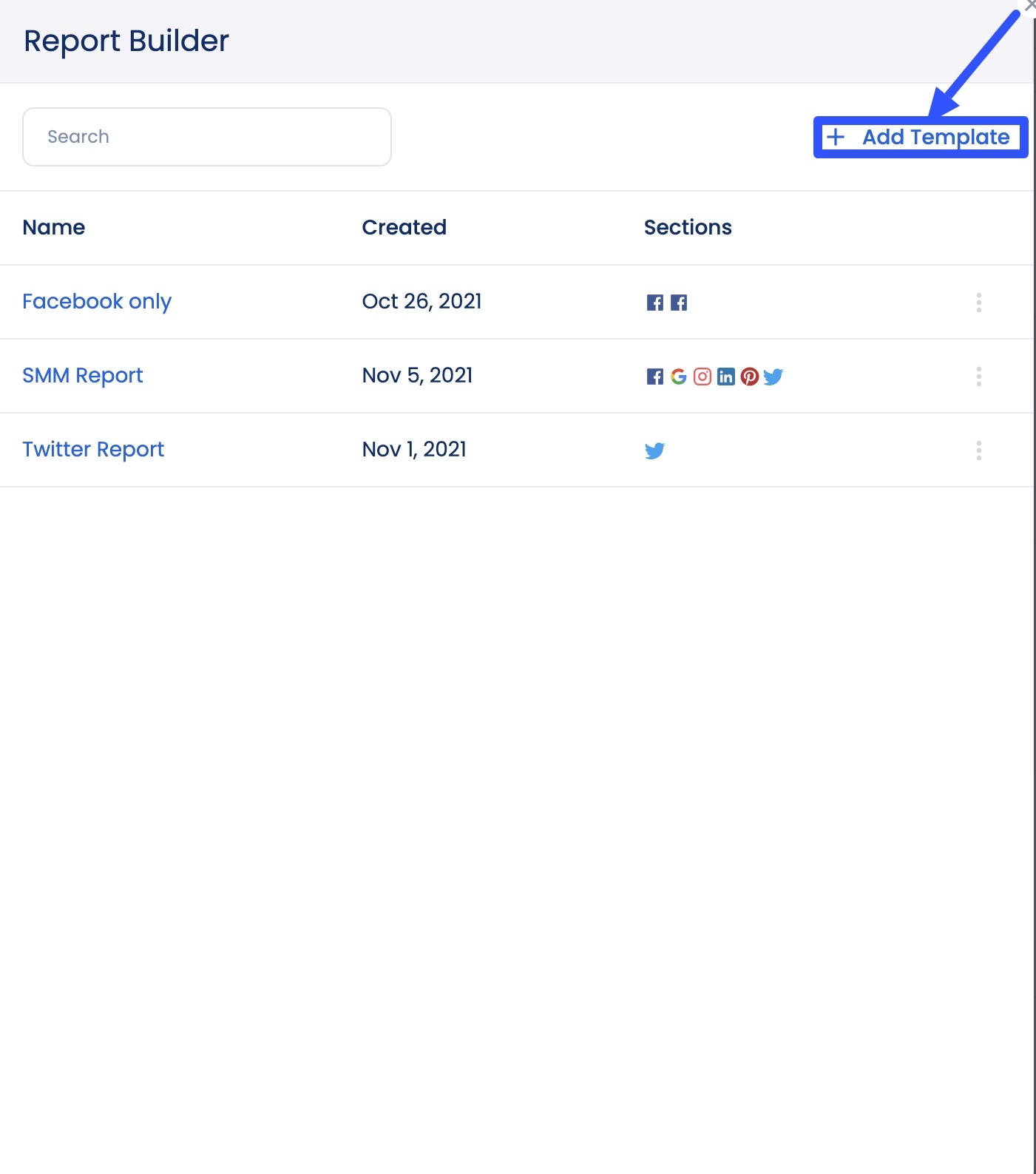
Next, select the metrics you want to include in your report template from the right side panel.
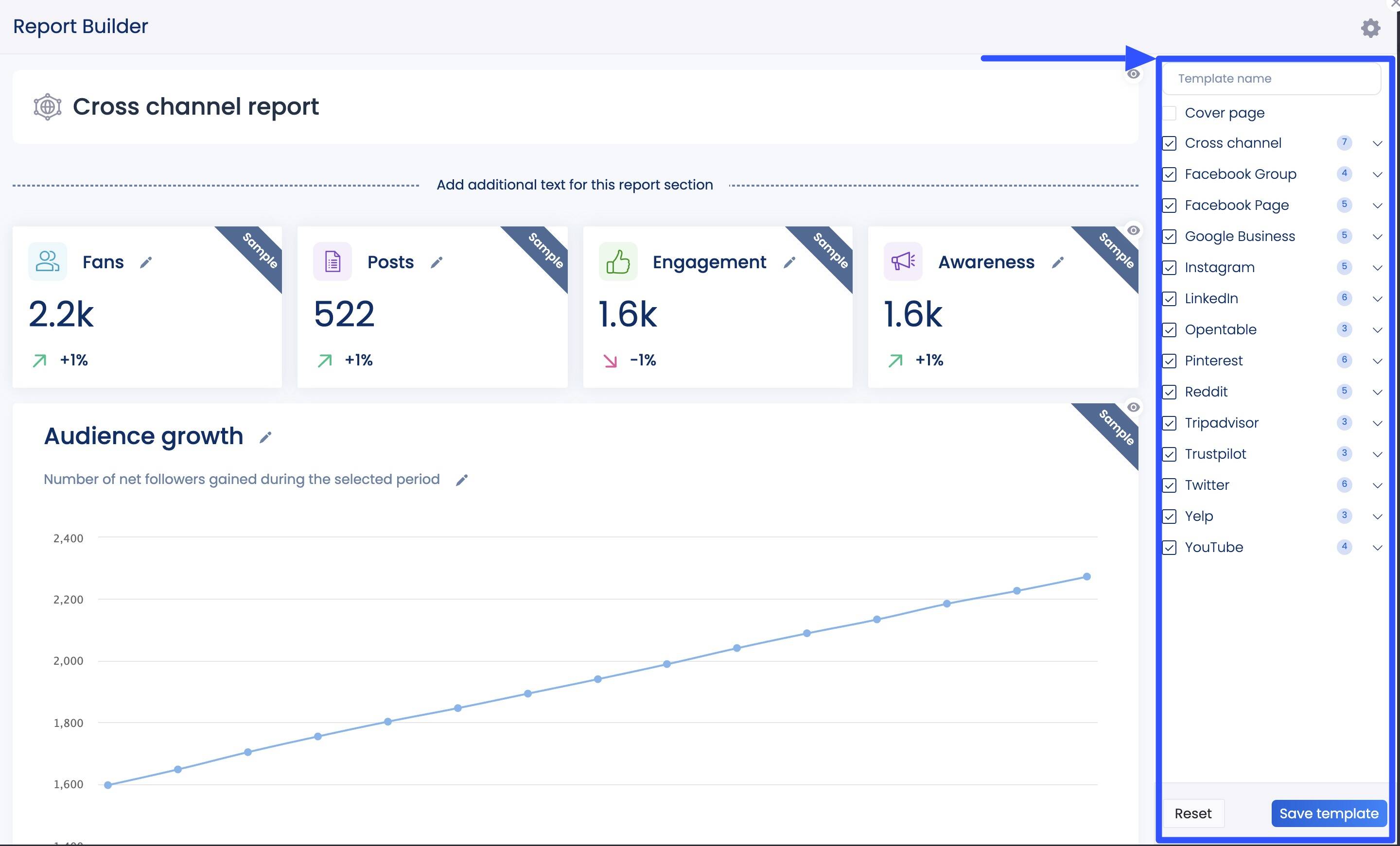
You can also add a cover page, which can be an image or text on the report’s first page.
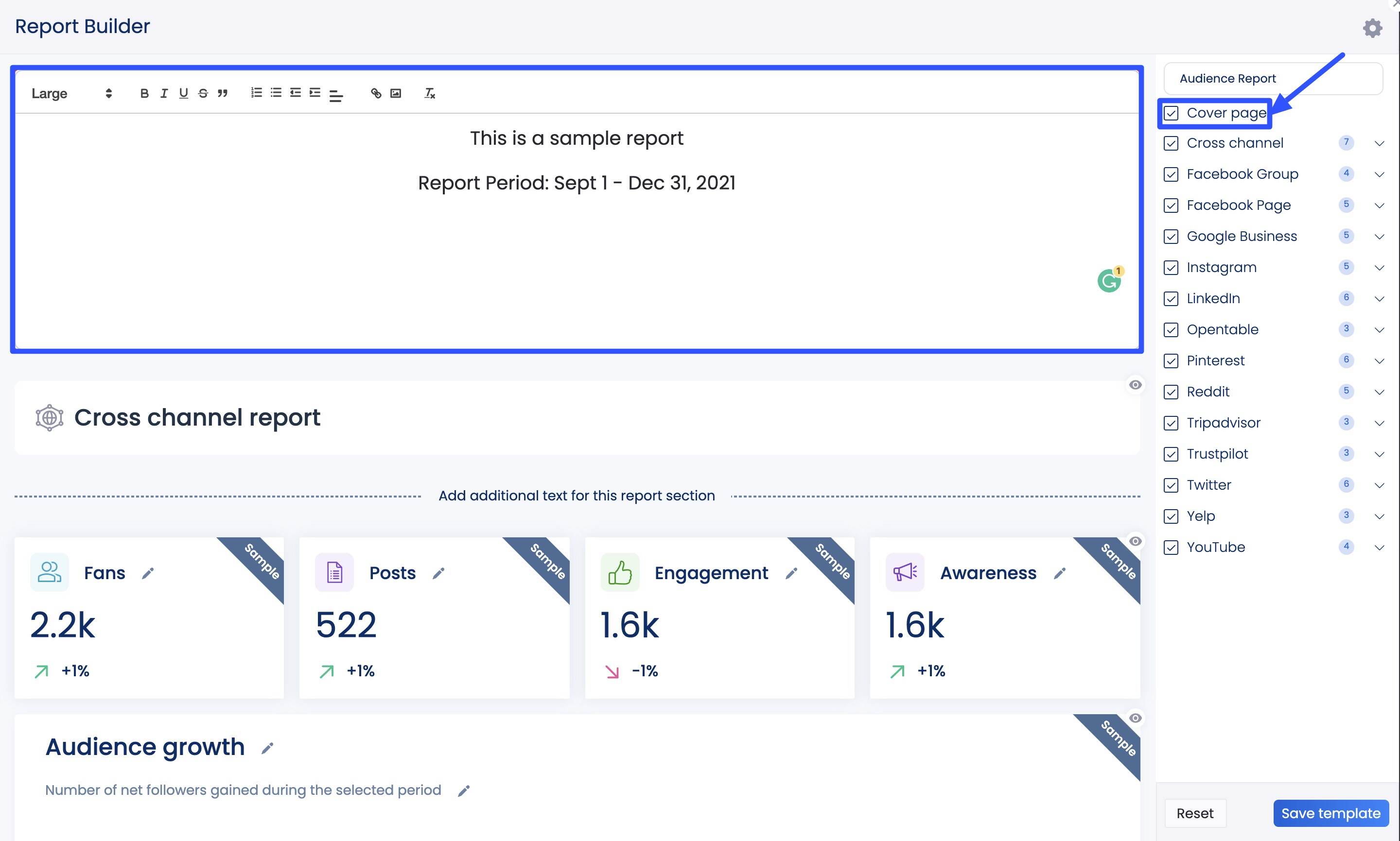
Customize other parts of the report by:
- Adding more text for each section to give your data more context and information by clicking the text or text field and typing your new or additional text
- Renaming your metrics to match the ones you use by clicking the pen icon beside the metric’s title and entering the new name
- Hiding the sections you want to exclude from the report by selecting the eye icon on the upper-right corner of the section.
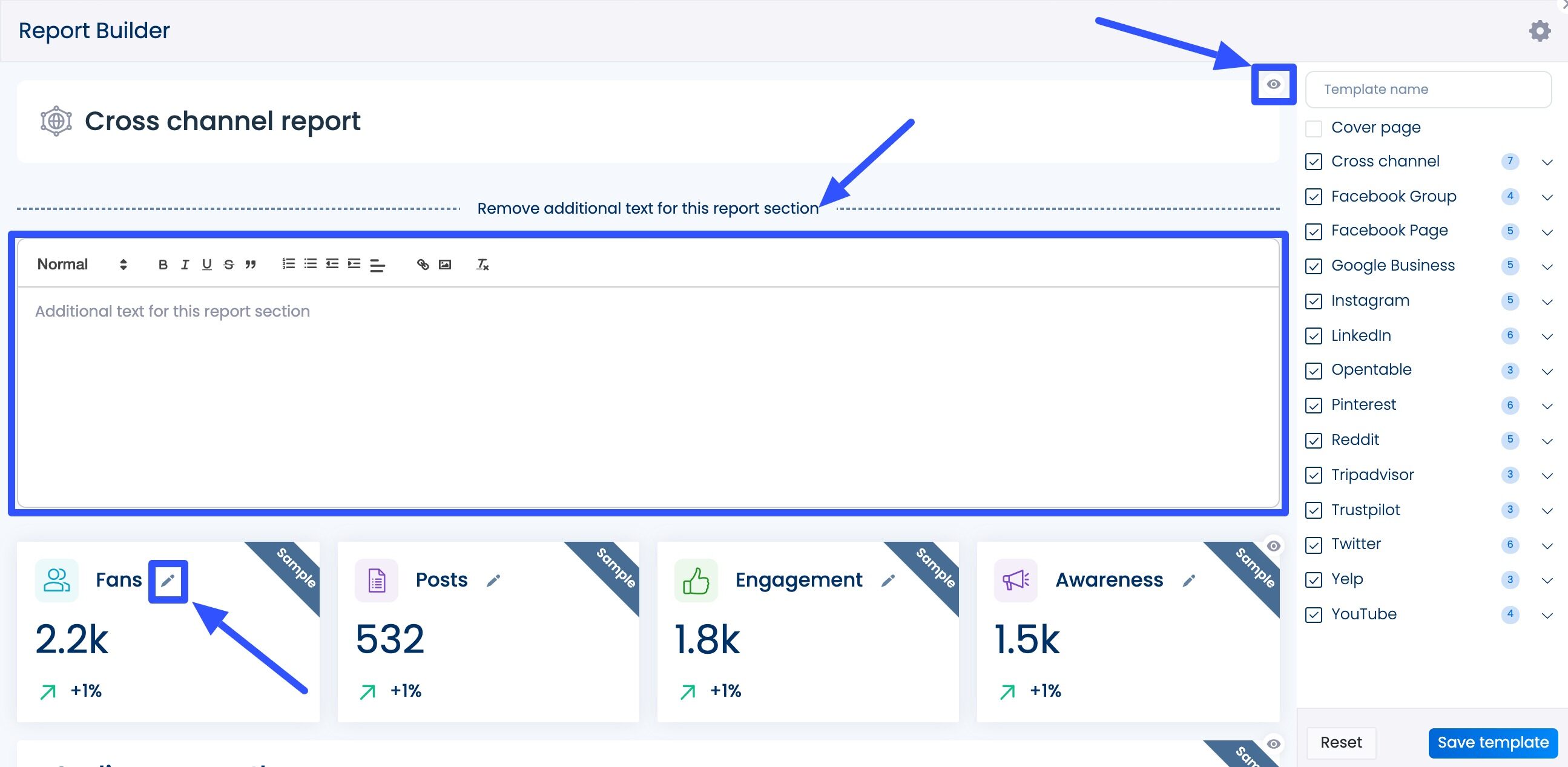
Name your report template at the top and click Save template at the bottom-right corner when you’re done.
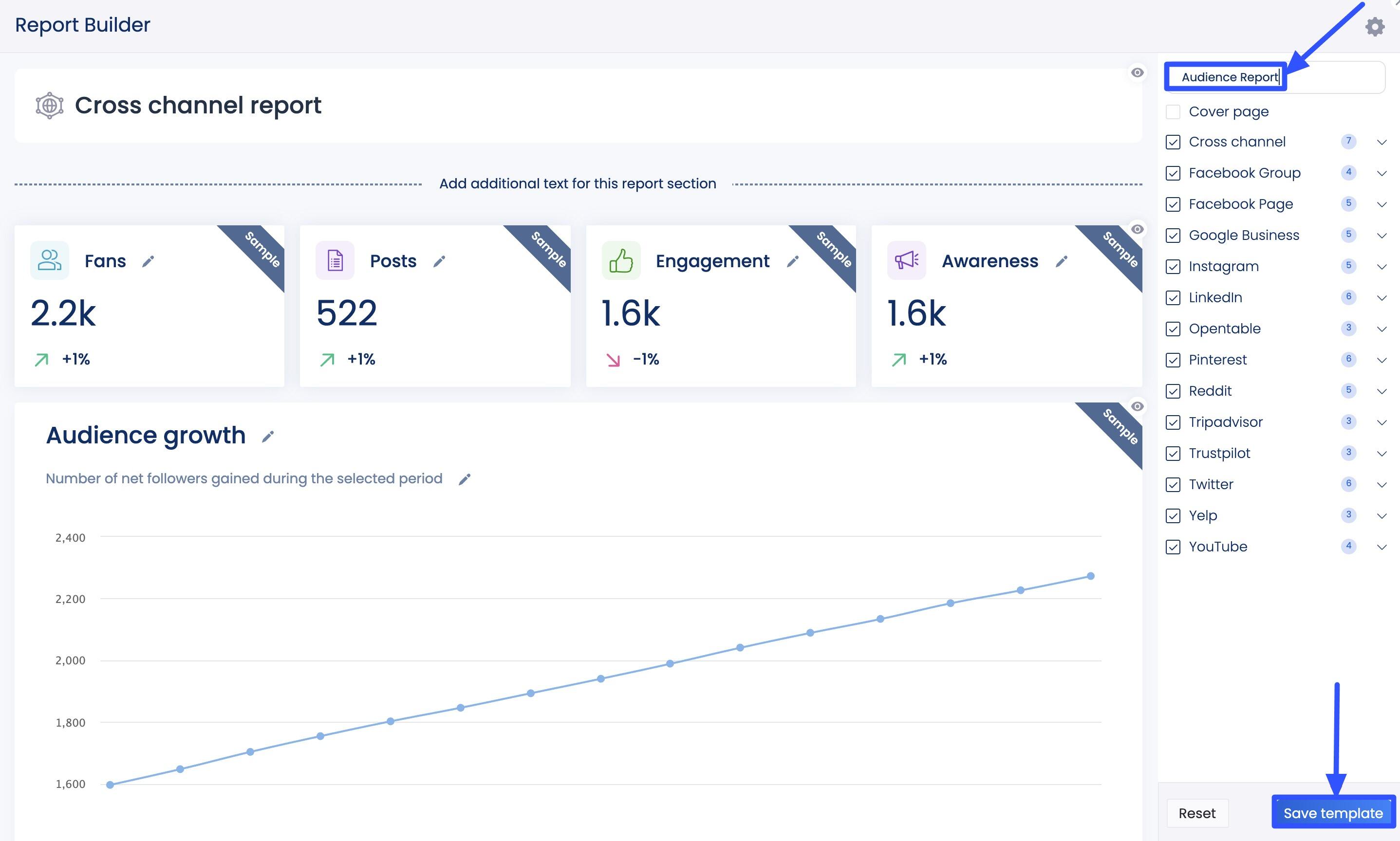
You can run your custom report by going back to the Report Builder, selecting your template, and clicking Run report.
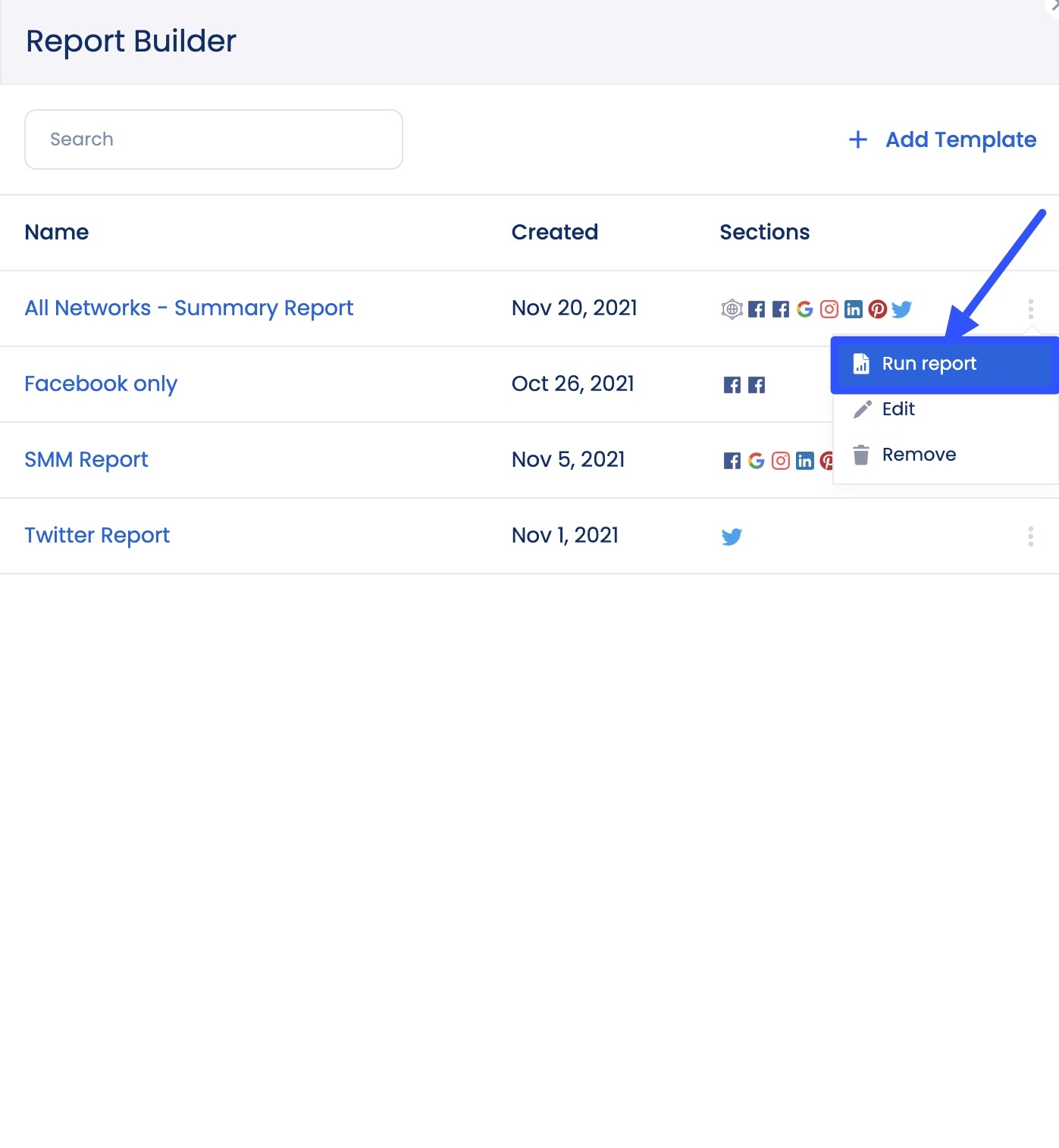
You can also run your report from the Reports dashboard.
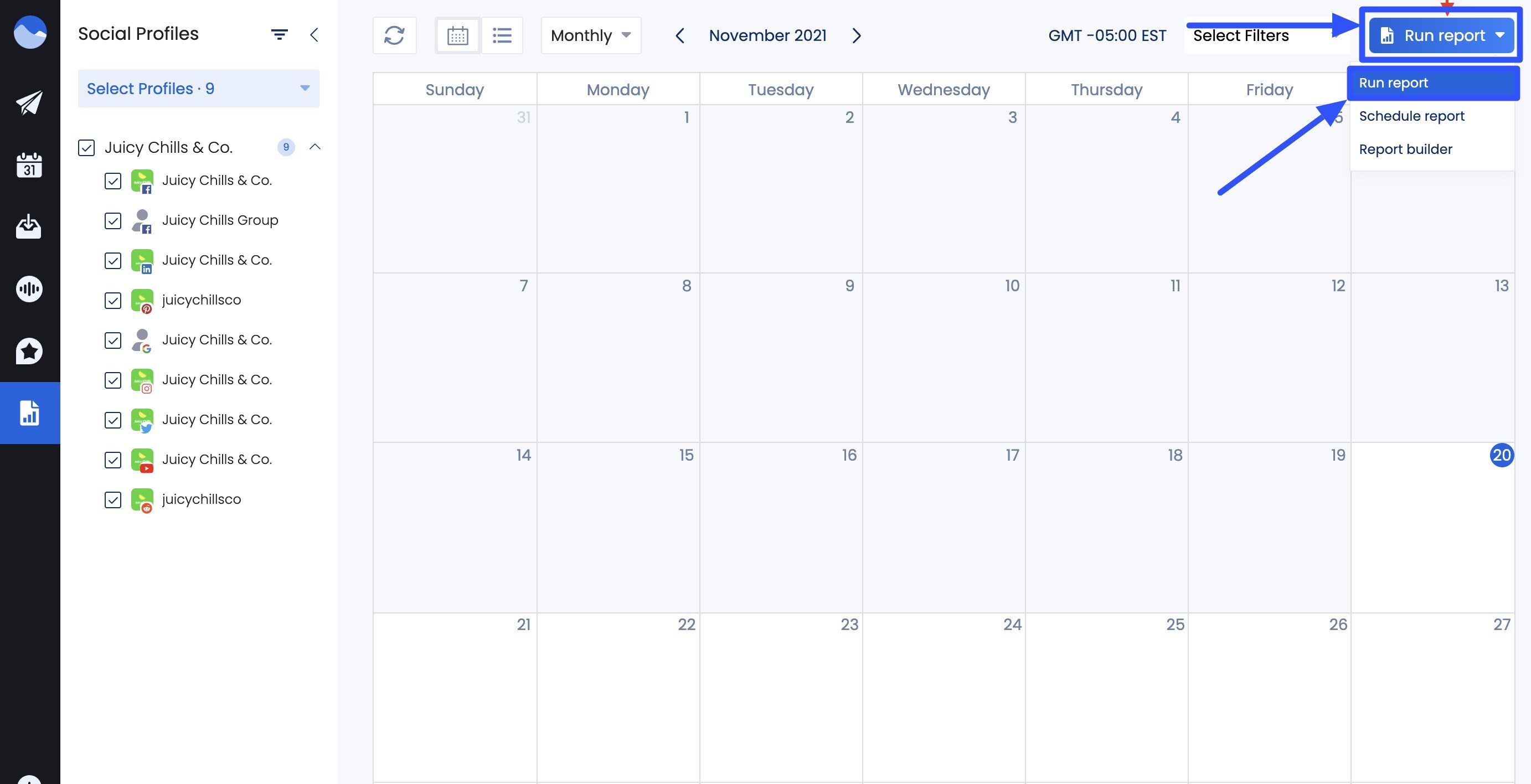
Select the data range you wish to generate a report to on the Report View.
After choosing the date, you can click the download icon to get a PDF copy of your report, which you can send to your clients.
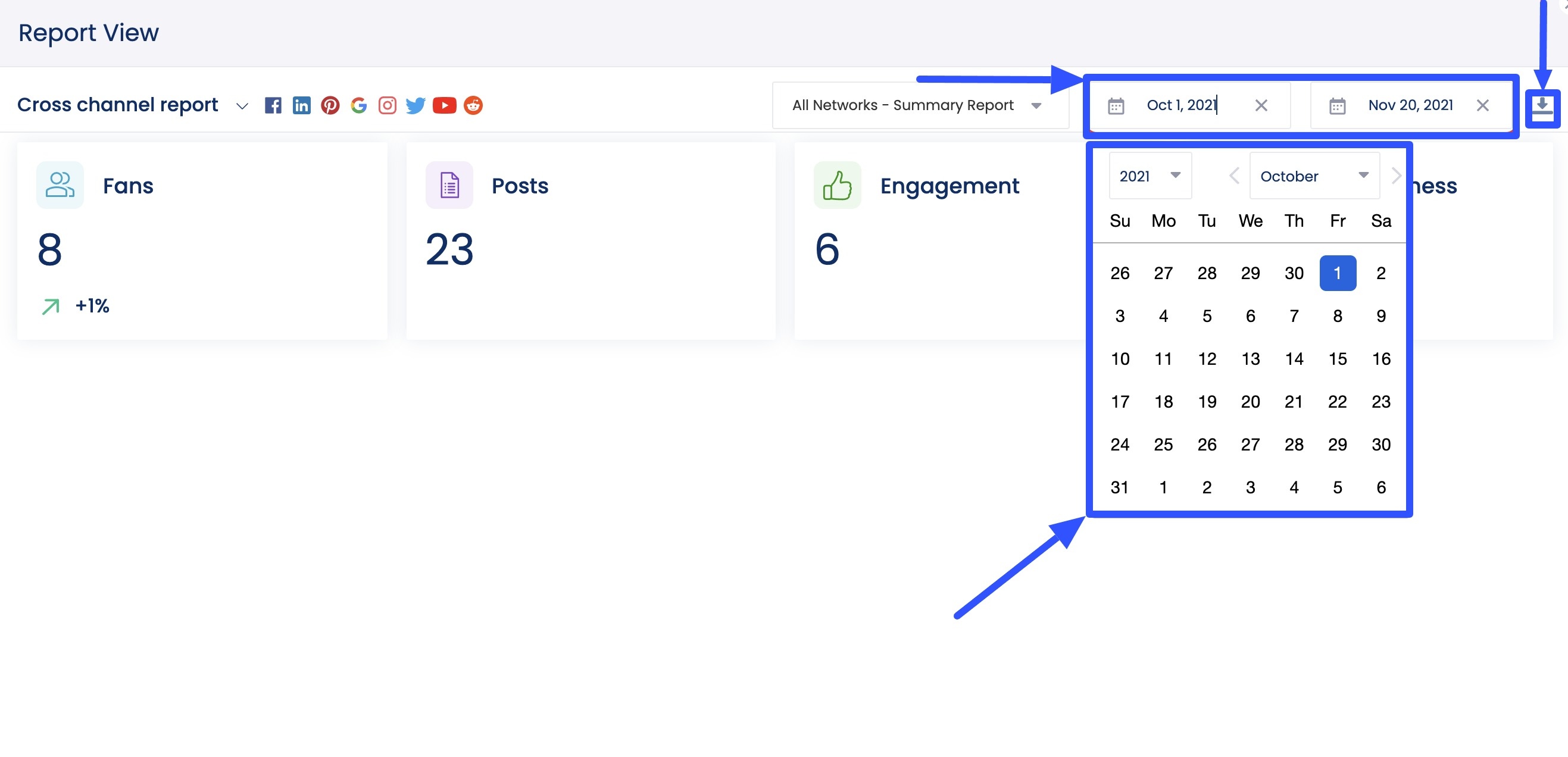
While data shows that 61% of marketers use Google Analytics to track and measure social media metrics, you’re better off using a dedicated social media management platform for reporting and analytics.
This way, you can do everything in one platform, eliminating switching between platforms and collating data from various sources.
Google CEO Sundar Pichai once said…
“Social media is a powerful tool that allows businesses to engage directly with their customers and build lasting relationships.”
..and the best way to leverage social media as a tool is through in-depth analysis and reporting to determine what’s working and what to refine to improve results.
Create automated social media reports with ease
Social media reporting doesn’t have to be time-consuming and draining.
By applying the tips in this guide and using the best social media management tool, you can automate your reports efficiently and effectively.
Platforms like Vista Social offer reliable social media and reporting features that automate running and scheduling your reports.
The platform also offers many social media management features, from content scheduling and an AI Assistant to link in bio and engagement management tools.
Create your Vista Social account to see all these features in action.
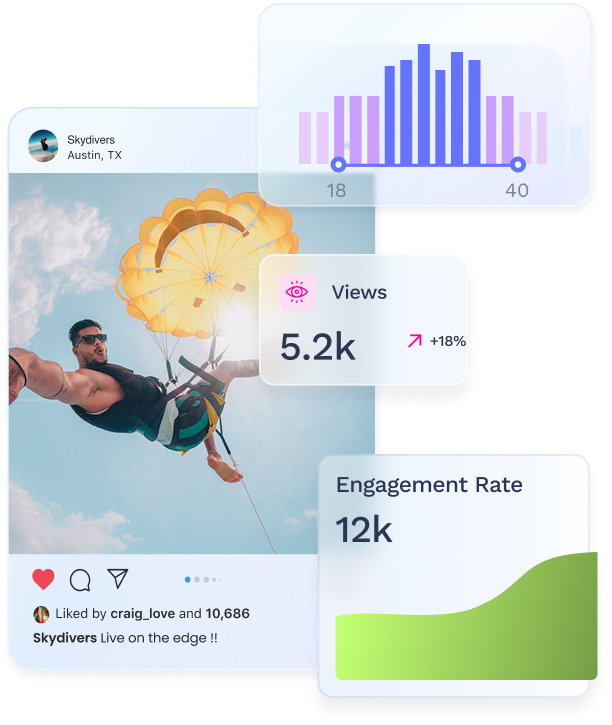
Try Vista Social for free
A social media management platform that actually helps you grow with easy-to-use content planning, scheduling, engagement and analytics tools.
Get Started NowAbout the Author
Content Writer
Jimmy Rodela is a social media and content marketing consultant with over 9 years of experience, with work appearing on sites such as Business.com, Yahoo, SEMRush, and SearchEnginePeople. He specializes in social media, content marketing, SaaS, small business strategy, marketing automation, and content development.
Read with AI
Save time reading this article using your favorite AI tool
Summarize with AI
Never Miss a Trend
Our newsletter is packed with the hottest posts and latest news in social media.
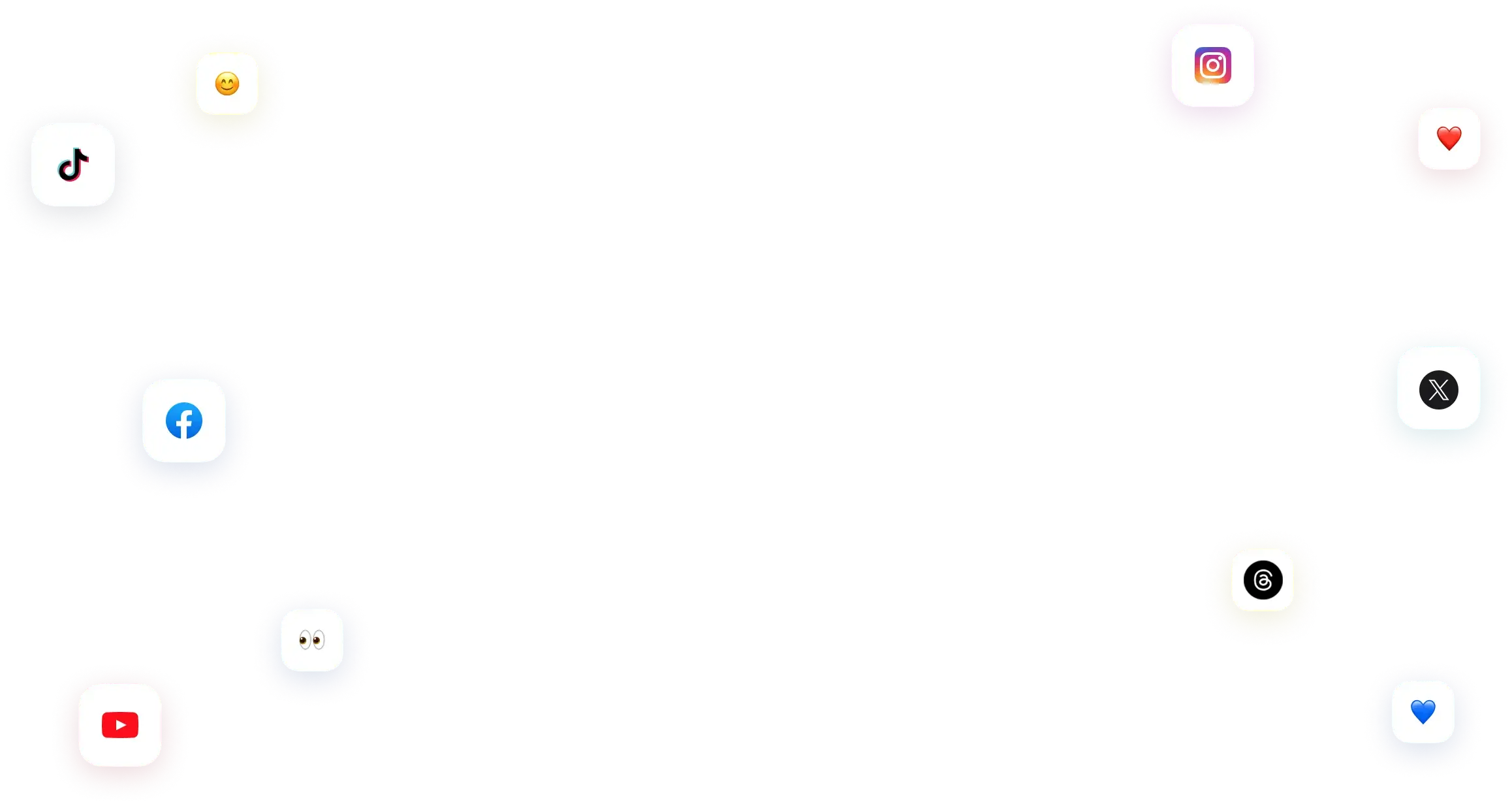
You have many things to do.
Let us help you with social media.
Use our free plan to build momentum for your social media presence.
Or skip ahead and try our paid plan to scale your social media efforts.
P.S. It will be a piece of cake 🍰 with Vista Social
Subscribe to our Newsletter!
To stay updated on the latest and greatest Social Media news. We promise not to spam you!
Enjoyed the Blog?
Hear More on Our Podcast!
Dive deeper into the conversation with industry insights & real stories.
